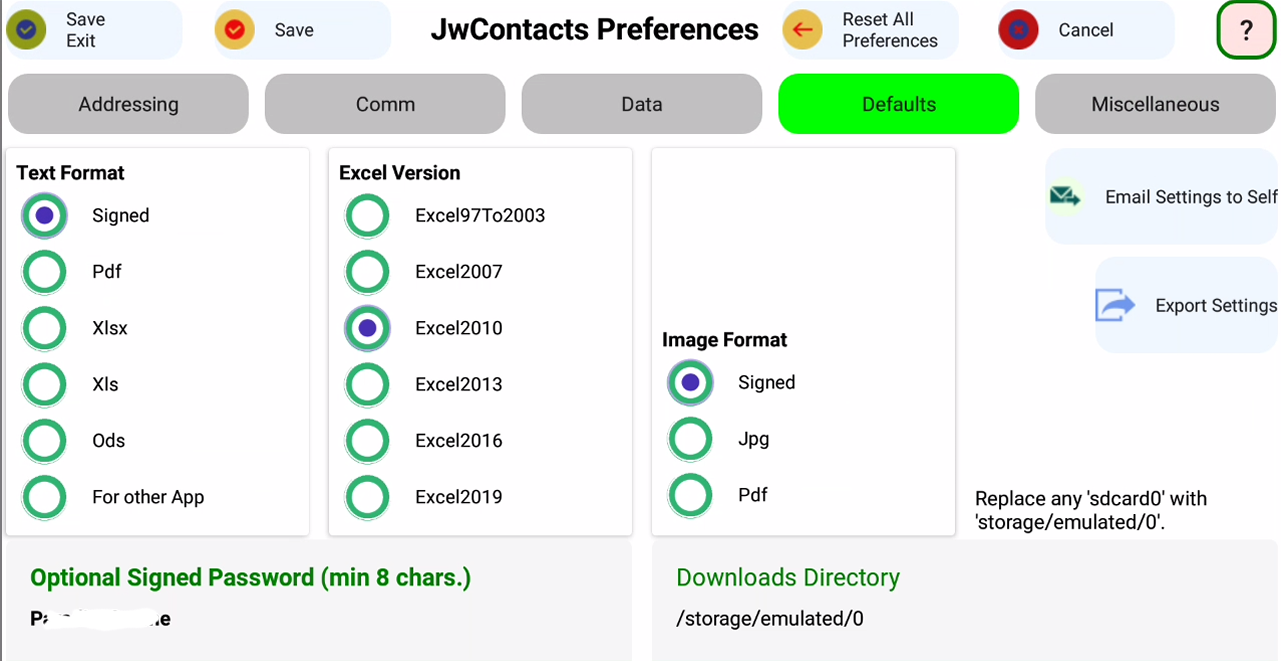Defaults
ALL DEVICES:
Preferred formats in sending data can be specified in Text Format, Excel Version, and Image Format.
Frequently only signed data can be re-imported, as such files contain required verification metadata,
Any preference can be over-ridden when actually sending data. See Sharing Data.
Directories (Android only):
Data for importation must be placed by some app, such as email, in the Downloads Directory.
Android users will also see this area:

If you have not already specified the folder, JwC will probably suggest one.
In any case, the Downloads Directory must be "public", reachable by any installed application.
You may need to append the name of a specific directory (such as the "download" portion above) to a type of storage.
The original "sdcard" no longer refers to something user removable.
Such memory is now known as Sdcard/1, NOT Sdcard/0.
However some older devices will instruct JWC to use that non-existent location.
To make it perfectly obvious you are using internal memory, as noted, show the first part of Downloads Directory
as "/storage/emulated/0/", which is the way an Android device actually understands the location.
In most cases you will want to extend it with something like the folder name download shown above
Signed
More accurately "compressed" ("zipped") as each signed export is a single compressed file whose contents are one or more files that can be re-created during uncompression.
However most JwC compressed files are also signed, that is, one of the included files is a descrptive of the other files and indicates who created the export.
Its purpose is four-fold:
a. The recipient can tell who created the export and when and is given a chance to reject its use if that data makes continuing unwise.
b. JwC can verify both the recipient and the creator are in the same Body of Elders. If not JwC rejects the file.
c. In some cases furnishes additional data the recipient would otherwise have to re-enter (such as Effective Date of a Document).
d. If the export involved use of the optional Password, includes means to verify decrypted files match the originals.
Text Format
Data in the Text format are JwC Primary, Primary Lite, and MyText.
Besides preparing data for imports by other JwC users, you can export for your own purposes data in any format shown.
"For other app" backs up Congregation Persons who are Publishers in formats acceptable to some other third-party apps.
While JWC could be restored from those as well, the data will be incomplete compared to any other Primary data backup format.
Pdfs are graphical representations of textual data and can not be used for importing, but only for viewing.
Excel Version
Xls is the older pre-2007 Excel format, Xlsx is preferred by all later Excel applications.
The xlsx Excel Version indicated here will be utilized in Sending Data when Xlsx is chosen as an export format.
If you here select Xls Send will use the Excel 2010 xlsx version by default for an xlsx output.
Image Format
All JwC data is considered "image" except for Primary, Primary Lite, and MyText.
The three choices will all apply to some, but not all, of the graphical items that can be backed up.
For instance, Territories can be backed up as Signed or Pdf, but not as Jpg.
The choice here is simply a preference.
Pdfs are graphical representations of data and, and except for Documents, Talks, Mediucal Directives, and Territories, can not be used for JwC importing, but only for viewing.
Optional Signed Password
Primary, Primary Lite, MyText, Documents, Talks, and Medical Directives can be protected with a password.
Protected exports have their data contents encrypted such that only members of the same BOE who know the password can decrypt them.
The password must be at least 8 characters long and must not include spaces or any of these characters: the comma, bar (i.e., |), semi-colon, colon, double quotes, brackets ( ie.,e. [ or ]), or arrows (i/e., ^ or the similar down arrow on some keyboard)
While typing the password will change from an initial red color to black, once it is acceotable for use.
Drawbacks of password use:
Passwords will make your exports highly-secure but there are things to consider:
a. Encreypted files cannot actually be compressed. In the single signed file the only contained file that will get compressed will be JwC's descriptor of the others. Therefore these signed files may be MUCH larger than unsigned holding the same data.
b. Some email services will automatically place some of them in the recipient's Deleted (or similar) folder. One such is Microsoft Outlook, which will delete some (Documents, etc.) but not all (Primary, etc.).
Therefore each time succh an export is created JwC will warn you some users may need to be notified.
Recipient workaround: His email service may allow creation of a standing exception. For instance in Outlook a rule can state that any email whose subject begins with JwContacts should go into a specified folder.
c. U.S. Law limits use of encryption in a small number of countries. Bs sure you are not in one of those while using JwC envcryption.
How secure are encrypted, signed exports?
Very, but total security is an impossibility.
The encryption is based on both the password AND a value derived from what is known about the Congregation.
To decrypt you must supply the password AND JwC must already know what that derived value is.
Wisdom dictates you change your own signed password from time to time, notifying intended recipients.
Can I therefore store sensitive data with online services using Password-protected Signed exports?
We all have the same organizational instructions.
What your conscience dictates as an answer to this question may well differ from mine.
Please act in the best of conscience in harmony with received instructions.
Email Settings to Self
Sends an email to the Email Account you arte using in the Comm | Email Account Settings tab.
This will be a zipped file with encrypted contents.
You will have to supply at least 8 encryption characters, which you MUST remember as JwC will never store them.
The email subject indicates both which device originated the email and when.
You will only to be able to re-import the settings on that device, as part of the encrypted data describes the device uniquely.
Therefore, even if someone else got the email AND the key, they would also still have to possess the device.
Once you have a number of settings, especially including any remote storage service or Twilio account data, it is strongly suggested you sendf this email AND be sure to be able to recall the key.
Export Settings allows JwC to create a settings file for import by another App (or another JwC given access on another device).

